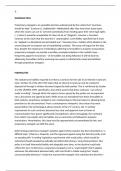1.
INTRODUCTION
Proprietary estoppel is an equitable doctrine underpinned by the notion that “promises
should be kept” (Lewison LJ, Habberfield v Habberfield) after they have been acted upon,
which the courts can use to “prevent [somebody] from insisting upon their strict legal rights
[...] when it would be unequitable for them to do so” (Bagnall J, Cowcher v Cowcher).
Contrary to the claim that the doctrine is ‘unprincipled’, Lord Walker specified that it must
be “applied in a disciplined and principled way” (Yeomans Row v Cobbe) which alludes to the
overarching aim in property law of establishing certainty. This essay will argue for this idea
that, despite the importance of individuals adhering to formalities in property transactions,
proprietary estoppel can provide a sensible, principled solution to the realistic issue –
frequently apparent in land law – of formalities not being followed. It will be done by
addressing formalities, before assessing how equity is satisfactorily raised and satisfied
through proprietary estoppel.
FORMALITIES
The statutory formalities required to enforce a contract for the sale of an interest in land are
clear: Section 53 of the LPA 1925 states that an interest in land can only be created or
disposed of through a written document signed by both parties. This is reinforced by Section
2 of the LP(MP)A 1989, specifically s.2(1) which asserts that these contracts “can only be
made in writing”, through which the express terms agreed by the parties are incorporated
into a document and signed by both. While trusts are exempted from these formalities in
both statutes, proprietary estoppel is not, emphasising its informal nature in allowing these
provisions to be circumvented. From a contemporary viewpoint, since these Acts were
passed before the technological advancements of the 21st century, the ‘in writing’
requirement for such contracts becomes less clear and apparent now as forms of
communication have grown significantly (smartphones, direct messaging), the confusion
from which may explain why formalities are so commonly not followed in property
transactions. Nevertheless, this issue must be appropriately accommodated by law, and
proprietary estoppel can fulfil this need.
Determining proprietary estoppel’s position against these statutes has been described as “a
difficult topic” (Sharma v Simposh), and the argument against using the doctrine partly rests
on equating this ‘in writing’ legislative requirement with social policy, which would be
subverted should estoppel be judicially permitted (Kok Hoong v Long Cheong Mines). But,
policy is in itself inherently flexible and adaptable over time, so the doctrine could only
reflect this fact. Furthermore, proprietary estoppel is not so ‘unprincipled’ that it applies
whenever the defendant behaves badly, with Lord Scott in Cobbe saying that “simply
unconscionable behaviour” would not warrant this estoppel: this maintains the doctrine’s
, principled jurisdiction, and also protects against the wider issue of ‘compensation culture’ –
similarly prevalent in tort law – by raising the threshold for such estoppel claims.
RAISING THE EQUITY
To explore the principles within proprietary estoppel further, the first stage of the doctrine
should be analysed: establishing the interest, which is all about intention and detriment. The
first requirement to raise the equity is that a sufficiently clear ‘representation’ was made by
the defendant (Thorner v Major). The assurance in Cobbe was one of a consequential
negotiation leading to a contract for the sale of land, which is “not an expectation of an
interest having any comparable certainty” as it does not constitute a certain proprietary
interest – no “identified property” is being promised as in Thorner where, despite the
promised farm changing shape over time, it was “the extent of the farm was liable to
fluctuate” and remains identifiable (Lord Walker). According to Lord Scott, if the doctrine
was allowed in these circumstances, it would “risk becoming unprincipled” (Cobbe), again
classifying proprietary estoppel as a principled jurisdiction. He also referenced this key
principle of certainty in Thorner that representations should be “repeated or confirmed [...]
over a considerable period” for estoppel to arise. Thorner emphasised that the
representation’s validity is “hugely dependent on context”, with the “taciturn” nature of the
farmer influencing their view of the representation (Lord Walker), taking us to the next
requirement: the claimant’s ‘reliance’ on this representation.
In Cobbe, the commercial nature of the oral agreement, combined with their sufficient
experience in property matters, led the court to conclude that both parties knew they were
“not legally bound”, and therefore that “conscious reliance on honour alone will not give
rise to an estoppel” (Lord Scott). The courts assess such reliance retrospectively from the
time the claim is made – unlike the certainty of a term which is assessed at the outset –
which led Lord Hoffmann in Thorner to judge that the claimant “reasonably relied on the
[defendant’s] assurance from 1990” based on subsequent events confirming it. Tying in with
reliance is the third requirement of ‘detriment’, known as an unconscionable disadvantage
to the claimant. A “sufficient causal link” must exist between reliance and detriment which
must make it ”unjust or inequitable” to allow the defendant to go back on their
representation (Lewison J, Davies v Davies). In line with the flexibility of the doctrine itself,
this detriment can be spending money (Plimmer v The Mayor of Wellington) but can also
take another form such as selling land (Crabb v Arun District Council) or giving up career
opportunities (Jones v Jones) in reliance on the assurance.
If these three elements of estoppel are satisfactorily present, the final check on the criteria
is ‘unconscionability’, where “the result [must] shock the conscience of the court” (Cobbe).
The differences between Cobbe and Thorner in the uncertainties surrounding the
representations and the commercial-domestic contrast in the parties’ relationships led Lord
Neuberger to say that, while the outcome can become uncertain, a heavy focus on
technicalities, like strictly defining the extent of property, can introduce “a degree of




